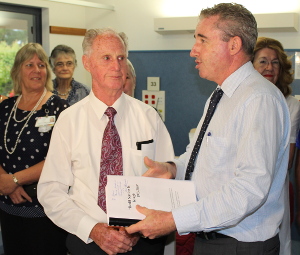
GPSpeak Autumn 2016
Sex and drugs and rock and roll ... and death, all essential ingredients of a good Australian miniseries, are raised in this issue of GPSpeak.
However, when the party's over, one can feel a little down. Staff specialist, Emanuel Vlahakis, gives practical advice to general practitioners on dealing with Gender Dysphoria (GD, page 21). Discrimination against transgender patients contributes to high levels of depression and suicidality. Recognising this risk and tapping into local resources to help such patients is a first step.
The acronym, MYEFO, sounds vaguely threatening. It is to the medical profession this year. Robin Osborne (page 18) outlines the changes to health in the Mid-Year Economic and Fiscal Outlook. Sussan Ley's doublespeak and doublethink defense of the changes attests to her being a most valued minister in the Turnbull government.
- Details
- Written by: David Guest

Grog still the most damaging drug
Despite media coverage about the ready availability and dramatic impact of methamphetamines, and the formation of the federal government’s National Ice Taskforce, alcohol continues to be the drug of greatest concern, both for users and society at large.
The anomaly is that it is the only drug (apart from tobacco) that is sold legally, still widely advertised, despite some restrictions, and lobbies actively to limit further restrictions on sales.
Some recent local statistics give a disturbing picture of the extent of the problem, as seen from the users’ perspective.
According to the NNSWLHD’s Mullumbimby/Byron Bay Drug and Alcohol Services, which provides support to clients in an area usually considered to have high level drug usage, alcohol was the principle drug of concern for 65.3% of referrals.
The 2014-15 figures revealed this was more than six times greater than the next two drugs, opioids and cannabis, both of which accounted for 10.7% of referrals.
Amphetamines rated 6.1%, and others, 2%. Male clients accounted for 62.4% of total referrals.
- Details
- Written by: Robin Osborne

Order in the House - February 2016
Aged care across the Northern Rivers received a major boost last week with my announcement of three new Aged Care beds in Kyogle and the unveiling of construction plans for an additional 32 beds at Crowley Care Services in Ballina.
This is wonderful news for our community.
The new home care places which were made possible by Federal Government funding of more than $2 million annually means our seniors can remain living in the local area and our community.
As readers know, the Northern Rivers has an ageing population and it is important to ensure they can stay in our community close to family and friends.
Since my last column, the Federal Government has announced a comprehensive $300 million package in response to the National Ice Taskforce that is designed to reduce demand for Ice and reduce the harm it causes, while continuing efforts to disrupt supply.
- Details
- Written by: Kevin Hogan, MP for Page
Managing adult Gender Dysphoria presentation
Dr Emanuel Vlahakis, Staff Specialist in HIV/Sexual Health, MNC LHD
Gender dysphoria (GD) is the distress or discomfort that may occur when a person’s biological sex and gender identity do not align. The term has replaced ‘gender identity disorder’. This change in terminology removes the ‘pathology’ from being transgender, which is not a mental health condition and shifts the focus of management onto helping treat the dysphoria that is associated with being transgender.
The true prevalence of GD is unknown in Australia because of varying definitions, different cultural norms and paucity of data. New Zealand reported an estimated prevalence of 1-in-6,000, with a natal male-to-female ratio of 6 to 1. However, research suggests the prevalence is much higher than previously thought.
Individuals who identify as transgender are vulnerable, and experience higher rates of discrimination, depression and suicidality, compared with the general population. It is important for GPs to have a basic understanding of gender dysphoria as they will often be the first point of contact for these patients.
- Details
- Written by: Dr Emanuel Vlahakis, Staff Specialist in HIV/Sexual Health

Low rating for new GP training arrangements
COMMENT, by Dr Ruth Tinker
We are now several weeks into the new GP training regime – so how are we doing?
Firstly in the spirit of full disclosure, I am one who wanted to withdraw services in protest at the centralisation of training providers in NSW. All other existing providers had been told they could only lodge a proposal to manage one of the new regions in NSW. So it came as a shock that one provider had not only been allowed to lodge several proposals, but that that single provider was then granted the entire state.
This means there is no longer any competition between providers, previously touted as an important way of improving quality.
- Details
- Written by: Dr Ruth Tinker
Page 141 of 177















